For the first time in a while, the League of Ireland Premier Division is set for a nerve-jangling run-in.
Unexpected league leaders Shelbourne are losing altitude as the season heads down the final straight, with just one win in eight, while second-place Derry City are struggling to capitalise.
Meanwhile, a resurgent Shamrock Rovers have catapulted into contention and are breathing down the pace-setters' necks as they pursue an unprecedented five-in-a-row.
The head games have started with Stephen Bradley innocently observing that the two teams in front of the Hoops may be "feeling it".
In the meantime, here are three memorable Premier Division campaigns that went right to the end.
1992-93: Bohs bus breaks down as score difference makes no difference
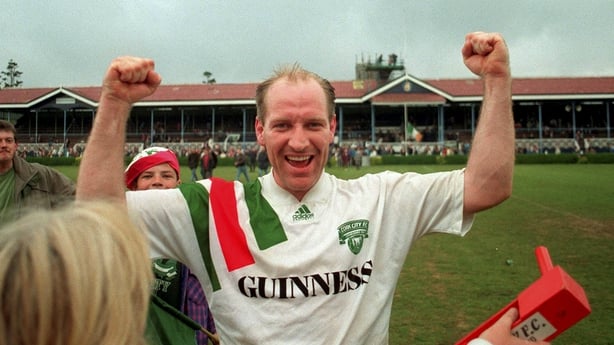
Pat Fenlon was still sore about this one when it was referenced at a press conference after he returned to Dublin from Hibernian 11 years ago.
Bohemians, FAI Cup winners from the year before, were on the brink of their first league title in 15 years, needing only a draw away to Dundalk at Oriel Park on the final day.
The league had adopted a jazzy new format ahead of that season, one which it jettisoned after two campaigns.
Once every team had played each other twice - 22 games - the table split into two groups of six, the top six playing each other twice again to vie for the league title and Europe, the bottom six playing off to avoid relegation.
While it was a brutal cut-off for those who found themselves outside the top six - a group which included St Patrick's Athletic and Shamrock Rovers - the new format produced one of the most exciting and eccentric league campaigns of them all. Only three points separated the top five at the finish.
Vying for the league title alongside Bohs were reigning champions Shelbourne and Cork City, seeking the city's first league title in 19 years and first under the 'City' name.
The latter were under the management of Noel O'Mahony, league title winner in 1970-71 with Cork Hibs, who had assembled a grizzled and experienced squad containing Dave Barry, John Caulfield, Liam Murphy and Declan Daly, with the prolific Pat Morley providing the bulk of the goals. Cork City had blown a glorious chance to win the league two years earlier, losing a final-day top-of-the-table clash to Dundalk.
Their bid for the title was covered in an unexpected little featurette on the BBC's Standing Room Only, where the cameras accompanied Sultans of Ping FC drummer Morty McCarthy on the supporters bus for an away trip Dalymount.
"There are more stories about Cork soccer than any other place in the world I'd say because they've played in so many different grounds," McCarthy remarked. "We were promised this vision of a stadium, like in Italy or somewhere like that."
Still, it appeared to be Bohs' title to lose. They required only a draw on the final day to secure the title, however that would have to be secured at Oriel Park, a notoriously awkward fixture.
Infamously, their team bus broke down going through Whitehall, with the players and officials having to load their gear on to the replacement, the delay badly impacting their preparation time and warm-up. Sportsfile's Ray McManus was on hand to capture the scene.
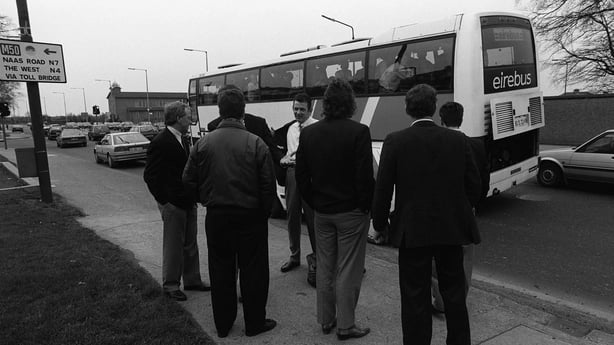
Dundalk's favourite Scotsman, Tom McNulty, who had scored the goal to deny Cork the title two years earlier, now scored the critical goal that kept their title hopes afloat. Cork City won 3-0 at home to Limerick on the same day, while Paul Doolin's last minute goal gave Shels victory at Derry City, leaving three sides on 40 points.
Had the League of Ireland been content to use goal difference, it wouldn't have mattered but their rules at the time stipulated that the league crown couldn't be awarded on the basis of such a grubby formula. Bohemians had a superior goal difference to their rivals but this counted for naught.
And so we were pitched into a three-way playoff for the league. Cork won at home to Bohs, Shels won at home to Cork, Bohs won at home to Shels. The return fixtures of all three games finished in draws. The three teams couldn't be separated, not even on goal difference.
An extended play-off would be needed, this time shortened, with each team playing each other once. Again, Cork beat Bohemians 1-0 in the opening fixture in Turner's Cross, giving themselves a shot at finally wrapping up the league title in the next game against Shels in the RDS, then home to Shamrock Rovers.
Whereas most of the play-off games had been cagey, this was an anarchic goal-fest. Morley's looped header put Cork in front, Gary Haylock equalised from the penalty spot after Harrington tripped Mark Rutherford.
Two-time All-Ireland winner and Cork City stalwart Barry restored their lead with a fine second goal but then Anto Whelan made it 2-2 after a bout of pinball in the Cork goalmouth. But then the league title was finally decided when the late Paul Bannon met a cross at the back post, sending a strange shot looping into the far corner, Morley heading to the net with the ball (possibly) already over the line.
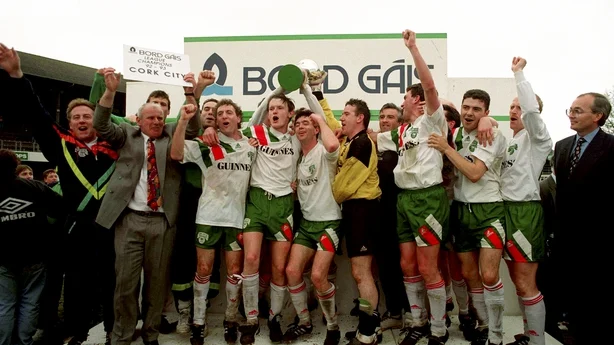
"It's nice to come up to Dublin and win a match of such magnitude and thanks be to God that 'nearly team’ tag has been buried forever," O'Mahony said afterwards.
The subsequent Bohs-Shels game at the RDS five days later was wholly immaterial. The three teams involved wound up playing each other a total of seven times over the course of that league campaign.
1994-95: Cake leaves Coutler's champagne on ice
The 1994-95 season reached an extraordinary crescendo, with three teams chasing the title on the final day and a GAA folk hero producing a Thibaut Courtois-style display to deny the league leaders the title.
Derry City were in pole position and seeking their second league title since joining the league 10 years earlier. They led by a point from Dermot Keely's Dundalk and Shelbourne, the latter being perennially involved in title races in that decade.
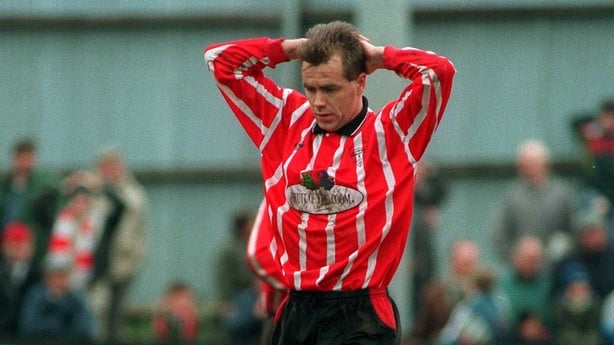
It was a bumper day for Sports Stadium, with George Hamilton dispatched to Athlone, Peter Collins sent to Oriel Park, while Jimmy Magee was in Tolka.
"It seems entirely appropriate in this remarkable season, when the championship has had more different leaders than a banana republic, that with 90 minutes to go, three clubs are still there in contention," said Jimmy, in flowery form, before interviewing Shels' London-born manager Colin Murphy on the pitch prior to their game with St Pat's.
The Candystripes knew that a win in St Mel's Park would guarantee the title regardless of what happened elsewhere. The northern side were under the management of the moustachioed Felix Healy, former Northern Ireland international who'd been a playing hero on the treble winning team of 1988-89.
While Healy admitted he and the players were nervous beforehand, others were not so circumspect, according to an anecdote later recounted by Athlone Town keeper (and now Carlow Gaelic football manager) Shane 'Cake' Curran.
Derry City's president at the time was songwriter Phil Coulter, who was unperturbed by the uniformly scathing reaction to his IRFU-commissioned ditty 'Ireland's Call, which had received its world premiere on the Late Late Show earlier that month - so bad it had to be "heard to be disbelieved" according to Con Houlihan.
"It stuck in my craw to see the champagne. I thought it was a bit presumptuous and a bit premature"
Coulter was in high spirits ahead for the trip to Athlone and unwittingly handed the hosts motivation beforehand, as Curran recalled in his autobiography 'Cake'.
"Derry City had arrived into Athlone with thousands of fans in tow, fully expecting to leave as league champions. We were deep in relegation trouble at the other end of the table," Curran wrote.
"I landed in the car park at St Mel’s Park just as the Derry City team coach also pulled in. Phil Coulter was following in a fine swanky car behind. I think Phil was honorary president of the club at the time.
"Then we noticed Coulter pulling a crate of champagne from the boot of his car, and another, and another. And as soon as I saw it, I could feel the heckles rising in me. They were hot favourites to roll us over, but it stuck in my craw to see the champagne. I thought it was a bit presumptuous and a bit premature."
The league hierarchy were of a similar mind, however, with the league trophy transported to Athlone, accompanied by red and white ribbons, and no replica available in either Dundalk or Drumcondra.
Derry were hit with a sucker punch within 13 seconds of the start, striker Donal Golden firing home an opportunistic goal on the half volley after blocking down an attempted clearance.
Derry recovered from this jolt and dominated the game thereafter. They were back level when Liam Coyle found the top corner with a spectacular shot from distance on 18 minutes.
Over in Oriel, Dundalk had begun pummelling the Galway United goalmouth, which they would do without success for the guts of 70 minutes.
Derry continued to search for the lead goal that would settle the nerves, their Parisian full-back Pascal Vaudequin unleashing a vicious shot from distance which forced an acrobatic save out of Curran.
After half-time, Derry were given a controversial penalty (how times change) when Ray McLoughlin, retreating back towards his end-line, appeared to have his ankles clipped by Liam Coyle and fell on the ball, handling it inside the area. The ref saw no foul from Coyle and awarded the penalty to the consternation of the home side.
Stuart Gauld had only missed one of 38 penalties til that point but Curran got his right hand to the shot, pushing it onto the post and out for a corner. The cameras zoomed in on the wincing Coulter, no champagne in sight.
Shels, who'd lifted themselves into the title race with a phenomenal late-season burst, were more or less ruled out of the reckoning when Pat's hit the front late in the second half. Stephen Geoghegan's injury-time equaliser arrived after the title was effectively out of reach.
At Oriel, Dundalk had frittered away a hatful of chances as they besieged the Galway goal. Eventually, they found the crucial opener in the most uncomplicated fashion imaginable. With the Galway defence pushing up, goalkeeper Eddie Van Boxtel horsed a clearance upfield. The big-game goalscorer Tom McNulty beat the offside trap, rounded the advancing Joey Power and side-footed into an empty net.
Now leading the 'As it Stands' table with less than 15 minutes remaining, Mick Doohan made it 2-0 moments later and the Oriel Park faithful went wild.
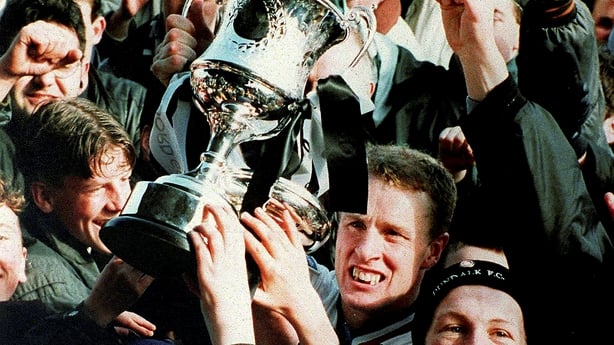
Over in Athlone, it was panic stations for Derry, as they frantically chased a winner. Deep in injury-time, Gauld floated in an old-style 'quarter-to-five' ball, which Curran flapped at. In the congested goalmouth, the huge Derry crowd waited for the net to ripple but Athlone defender Rod de Khors hoiked the ball off the line. Derry's last chance had gone.
Over in Oriel, the crowd gathered on the pitch in front of the main stand - which from a distance, looks not too different than it does now. The transistors and the PA system announced that Derry had drawn 1-1 in Athlone and the crowd exploded in joy.
"I knew the FAI were making a mistake bringing the league trophy to St Mel’s. They should have brought it to Dundalk," Athlone boss Michael O'Connor told the Westmeath Independent afterwards.
Derry and Healy would have the consolation of an FAI Cup triumph a couple of weeks later and would get their hands on the league trophy two after that.
2006: 'Well, I think he was a bit angry' - Roddy Collins
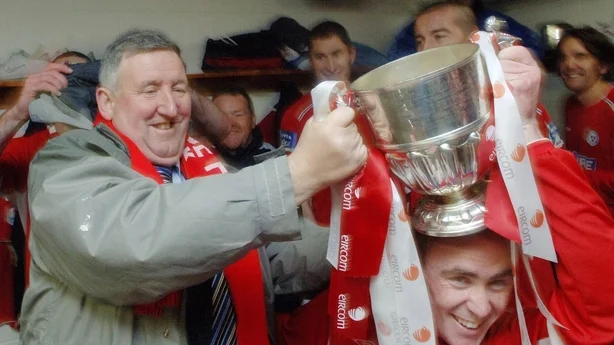
One of the more traumatic seasons in the history of the League of Ireland and a scenario which still echoes in the present day.
The 2006 campaign was the year when Ollie Byrne's Shelbourne, one of the leading lights of the league since the early 1990s, fell into a financial black hole - but still managed to haul themselves over the line for one last title before they were promptly demoted to the First Division.
Byrne's long era as Mr. Shelbourne has been well recounted in Eoin Brennan's 'Ollie's Reds' documentary. The son of former Shelbourne chairman Andrew Byrne, former band manager Ollie had resolved to take control of his family's club during a stint in prison in the 1980s for importing stolen cigarettes.
Aided by the largesse of the Donnelly family, Shels returned to the elite of Irish football, winning a first league title in over three decades in 1991-92. While they were nearly men in the league for the remainder of the 1990s, they became the dominant club in the early years of the new millennium, winning titles in 1999-00, 2001-02, and the first two calendar year seasons in 2003 and 2004.
The latter victory was accompanied by an unforgettable European journey, which saw them take down Champions League group stage regulars Hadjuk Split and then hold Deportivo La Coruna in the first 135 minutes of the last qualifying tie, in which the winners progressed to the group stage.
However, it had been an expensive business and by 2006, the scale of the financial strain was beginning to become clear.
In July, they were taken to the High Court by the Revenue Commissioners over €104,000 in unpaid tax bills, the judge giving them until October to pay up.
By then, the players weren't receiving their wages, with an increasingly desperate Byrne scrambling to secure money to keep the show on the road, at one stage being reduced to mowing the Tolka Park pitch himself as the groundsman couldn't be paid.
Despite it all, Shels won 13 of 17 league fixtures from mid-May to mid-October as they sought to hold off Stephen Kenny's Derry, who'd also lost the league on the final day to Cork City the year before.
In the midst of all this, more controversy. Dublin City, previously known as Home Farm (among other things), abruptly resigned from the league amid financial problems in mid-July and their results were expunged from the record.
This had big implications at the top of the table, with Shels having already taken six points from six from the defunct outfit and Derry City having only played them once and lost. In effect, Shels were docked six points, narrowing the title race substantially.
Shels began to falter near the end of an incredibly stressful campaign, losing 2-0 in a Brandywell six-pointer in late October and then fumbling a chance to seal the league in the penultimate game, losing 1-0 in Cork.
At last, on the final day, they beat Bohemians 2-1 to seal their fifth title in eight seasons, Glenn Crowe scoring the winner against his former club. However, the match and indeed the title race is best remembered for Stuey Byrne's famous 'I'm angry, Tony!' interview, in which he unloaded on Derry boss Kenny, his former manager at Longford Town.
"I had to deal with a barrage of phone calls after that," Byrne told The42.ie a few years back. "Derry City fans were ringing me in the middle of the night absolutely hammering me. It actually became quite funny in the end.
"You'd get phone calls at 4am, lads would have had a few drinks and this fella is roaring down the phone, or leaving messages on your phone. I remember I got a message from a girl, it was some young one just roaring and shouting down the phone at me."
Shels were demoted to the First Division in the off-season and their beloved (at least internally) supremo Byrne sadly passed away the following year with a brain tumour.
Eighteen years on, Shels are back in a title race. Have Duffer's charges the staying power to haul themselves over the threshold this time?
Disclaimer: The copyright of this article belongs to the original author. Reposting this article is solely for the purpose of information dissemination and does not constitute any investment advice. If there is any infringement, please contact us immediately. We will make corrections or deletions as necessary. Thank you.






